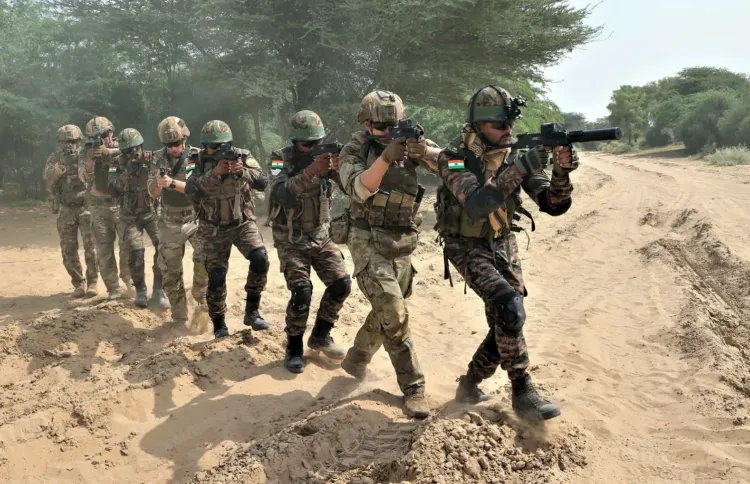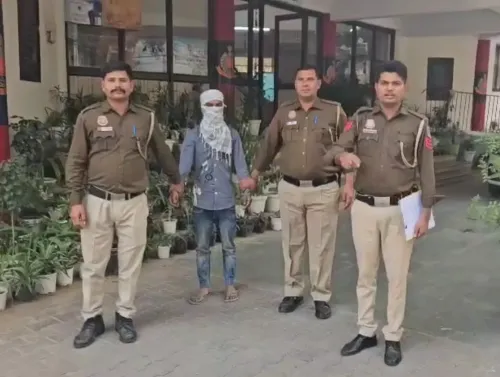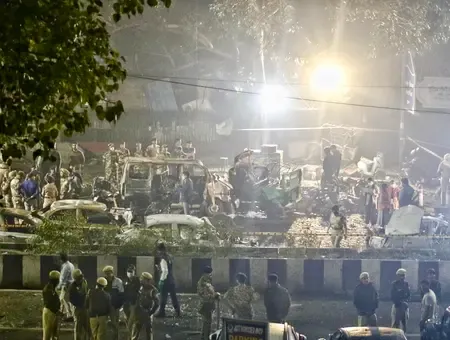Is the Rajasthan Border with Pakistan Now Completely Secured?

Synopsis
Key Takeaways
- Rajasthan border with Pakistan is sealed post-Operation Sindoor.
- BSF and IAF are conducting round-the-clock patrols.
- Emergency evacuation plans are prepared but not yet executed.
- Fuel management measures are in place in Bikaner.
- Intensified military presence observed on both sides of the border.
Jaipur, May 8 (NationPress) Following India's Operation Sindoor, the 1,037 km border that Rajasthan shares with Pakistan has been effectively sealed, leading to a notable uptick in security measures. The Border Security Force (BSF) and Indian Air Force (IAF) are maintaining a heightened state of alert, executing continuous surveillance and combat patrols amidst rising tensions in the region.
All airbases in the Western Sector, particularly Jodhpur, Jaisalmer, Nal, Phalodi, and Uttarlai, are under strict vigilance. Fighter jets, such as the Sukhoi Su-30 MKIs equipped with cutting-edge armaments, are on patrol from Sri Ganganagar to the Rann of Kutch.
On the ground, the BSF has escalated its patrols near the zero line. More troops have been positioned in sensitive areas to guarantee a rapid response to any suspicious activities. Soldiers have been authorized to engage at the slightest hint of provocation.
Additionally, anti-drone systems are operational round-the-clock to thwart any aerial incursions from across the border.
Despite the increased military presence, local villages along the Rajasthan border remain unevacuated.
However, BSF Rajasthan Frontier Inspector General M.L. Garg has confirmed that emergency evacuation plans are ready. Extra personnel have been relocated from barracks and are strategically stationed as part of preparedness protocols. In light of recent threats, fighter aircraft are frequently taking off from major Western Sector bases.
On Wednesday morning, the sound of jets reverberated through the skies, with several aircraft launching and landing throughout the day. These operations are part of a NOTAM (Notice to Airmen) issued for intensive aerial maneuvers over a 48-hour window. Air defense missile systems have also been activated in key Indian cities.
In case of an enemy aircraft entering Indian airspace, these systems are ready to intercept and neutralize aerial threats without delay.
The Indian Army is also fully operational, with all border formations mobilized and prepared. In response to the recent airstrikes by India on terror camps in Pakistan and Pakistan-occupied Kashmir (PoK), the Bikaner district administration has implemented emergency fuel management measures.
As per an official order from District Magistrate and Collector Namrata Vrishni, all petrol stations in Bikaner must reserve 2,000 liters of petrol and 5,000 liters of diesel. This fuel stock is designated for emergency vehicles and essential services to ensure continuous operations during a crisis.
Furthermore, there has been a considerable mobilization of Pakistani Army personnel in villages bordering Rajasthan, including areas from Khajuwala to Sri Ganganagar.
This military buildup has been observed in various strategic locations across the border, such as Khara Toba, Sirdakhli, Bijnoth, Zahuriwala, Rahimyar Khan, Sadiqabad, Khanpur, Liaqatpur, Yazman Mandi, Fort Abbas, Mujgarh Fort, Fakirwali, Bahawalnagar, Bahawalpur, KK Tibba, and Lal Saharana National Park.









